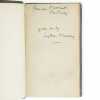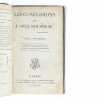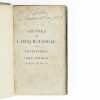Partridge, Frances / Rousseau, Jean-Jacques / Strachey, Lytton
Oeuvres de J. Jacq. Rousseau : Confessions
Paris Pierre Didot l'aîné et Firmin Didot 1808 Paris, Pierre Didot l'aîné et Firmin Didot, 1808. 4. [2] ff. - 256 pp. + 252 pp. + 296 pp. + 244 pp.. Reliure de l’époque, plein veau vert, dos à nerfs orné, encadrement d’un double filet à froid sur les plats, roulette sur les coupes, roulette intérieure à froid, tranches peignées. Dos passés, frottements, mors épidermés et fragilisés avec mors supérieur fendu au vol. 1, pièce de titre manquante au vol. 3, manques aux coiffes supérieures, coins frottés. Rousseurs. Édition stéréotype en4 volumes imprimée selon le procédé de Firmin Didot. EXEMPLAIRE DE FRANCES PARTRIDGE DONNÉ PAR LYTTON STRACHEY. Frances Marshall Partridge given me by Lytton Strachey L'une des dernières artistes à rejoindre le Bloomsbury group, Frances Marshall épousa Ralph Partridge, proche de Lytton Strachey qui avait longtemps cohabité avec lui et sa première femme Dora Carrington. Starchey, alors déjà célèbre comme l'auteur de Eminent Victorians, confia au couple la préparation d'un projet d'édition du journal intime de Charles Greville qu'il avait entrepris. The Greville Memoirs parut en 1938, avec Starchey comme directeur éditorial. Les membres du Bloomsbury nourrissaient en effet un intérêt certain pour les modes de la confession et de l'autobiographie. On songe notamment au projet Memoir club, dérivé du Bloomsbury dans les années 1920.Sous l'influence de Strachey, le Bloomsbury group avait en outre reconnu Rousseau comme un précurseur du Romantisme et de la modernité, la distance culturelle entre le philosophe et ses contemporains faisant écho à celle qui s'était créée entre le groupe et la société de l'époque. Lytton écrit ainsi dans "The Rousseau affair" (Books and Characters) : "As we see him now, in that long vista, Rousseau was not a wicked man; he was an unfortunate, a distracted, a deeply sensitive, a strangely complex, creature; and, above all else, he possessed one quality which cut him off from his contemporaries, which set an immense gulf betwixt him and them: he was modern. Among those quick, strong, fiery people of the eighteenth century, he belonged to another worldto the new world of self-consciousness, and doubt, and hesitation, of mysterious melancholy and quiet intimate delights, of long reflexions amid the solitudes of Nature, of infinite introspections amid the solitudes of the heart. Who can wonder that he was misunderstood, and buffeted, and driven mad?" Précieux exemplaire de ce texte fondateur de "l'écriture du soi",véritableassociation copy de deux membres du Blomsbury Group, le biographe Starchey et la diariste Partridge. Les exemplaires, reliés à l'époque en veau vert, furent très consultés et présentent de nombreux défauts. "HJ Eaton, London 5 May 1852" ex-libris manuscrit sur les quatre faux-titres FRANCES PARTRIDGE'S COPY, GIFTED BY LYTTON STRACHEY. Autograph ex-libris and note by F. Partrige on the first volume: Frances Marshall Partridge given me by Lytton Strachey One of the last artists to join the Bloomsbury group, Frances Marshall was the wife of Ralph Patridge, a close friend of Lytton Starchey--the two of them, along with Partridge's first wife Dora Carrington, had famously lived under the same roof. Together, Frances Marshall and Ralph Partridge prepared an edition of Charles Greville's diary, a project which Starchey had started. The Greville Memoirs were published in 1938, with Starchey as editorial director. The Bloomsbury's interest na the modes of confession and autobiography (one may recall the 1920s Memoir club project) found an echo in Rousseau's Confessions; in addition, the Bloomsbury group, under Starchey's impulsion, had come to recognize Rousseau as a a fundamentally "modern" figure, a proto-Romantic whose distance from his contemporaries mirrored that which existed between the Bloosmbury and society at large. In "The Rousseau affair"(Books and Characters), Lytton wrote: "As we see him now, in that long vista, Rousseau was not a wicked man; he was an unfortunate, a distracted, a deeply sensitive, a strangely complex, creature; and, above all else, he possessed one quality which cut him off from his contemporaries, which set an immense gulf betwixt him and them: he was modern. Among those quick, strong, fiery people of the eighteenth century, he belonged to another worldto the new world of self-consciousness, and doubt, and hesitation, of mysterious melancholy and quiet intimate delights, of long reflexions amid the solitudes of Nature, of infinite introspections amid the solitudes of the heart. Who can wonder that he was misunderstood, and buffeted, and driven mad?" That a copy of this seminal book on "the writing of the self" passed from biographer Lytton's hands to those of memoir-author Frances Partridge is then both significant and moving. "JLK[??] Eaton, London 5 May 1852" ex-libris in ink on all four half-titles. Contemporary green calf binding, raised bands and gilt decor on the spine with red title piece, double blind frame on the boards, gilt border on the spines, inner blind border, combed egdes. Spines discolored, some rubbing, joints scuffed and loose with upper joint split on vol. 1, title piece missing on vol. 3, lacks on headcaps, corners rubbed. Foxing. Couverture rigide
Reference : 13575
Bookseller's contact details
Librairie Le Pas Sage
Nicolas Lieng
80, rue Joseph de Maistre
75018 Paris
France
contact@librairie-le-pas-sage.com
09 88 40 55 75
Payment mode
Sale conditions
Prix nets. Port en recommandé à la charge du client. Règlement par chèque ou virement. Expédition après réception du paiement. <br />
 Write to the booksellers
Write to the booksellers







